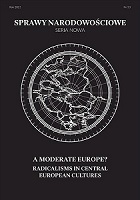How Poles Radicalised Belarusians: On the Mechanism of Coercion
How Poles Radicalised Belarusians: On the Mechanism of Coercion
Author(s): Katarzyna KurzaSubject(s): Political history, Social history, Nationalism Studies, Interwar Period (1920 - 1939)
Published by: Instytut Slawistyki Polskiej Akademii Nauk
Keywords: Belarusians; the Second Polish Republic; radicalisation; coercion; repressions;
Summary/Abstract: The great reconstruction of Central-Eastern Europe after World War I mainly consisted in building national states in place of multinational empires, but it also involved social transformations. The changes carried out in highly ethnically diverse and socially polarised area of the former Polish-Lithuanian Commonwealth were selective and contributed to the contentious actions of the indigenous people. Their radicalism was often a response to a new order, created as an attempt to reproduce the feudal system in the realities of the national state. In this article I show the path of radicalisation in repressive settings, which Belarusians followed in an unequal struggle for their rights. I attempt to explain their radicalism by geocultural factors, which I regard as causal mechanisms, repeated in different historical contexts. I identify two such mechanisms, of coercion and of blocking change, and present how radicalism was generated by the operation of this binary sequence.
Journal: Sprawy Narodowościowe
- Issue Year: 2021
- Issue No: 53
- Page Range: 1-17
- Page Count: 17
- Language: English

